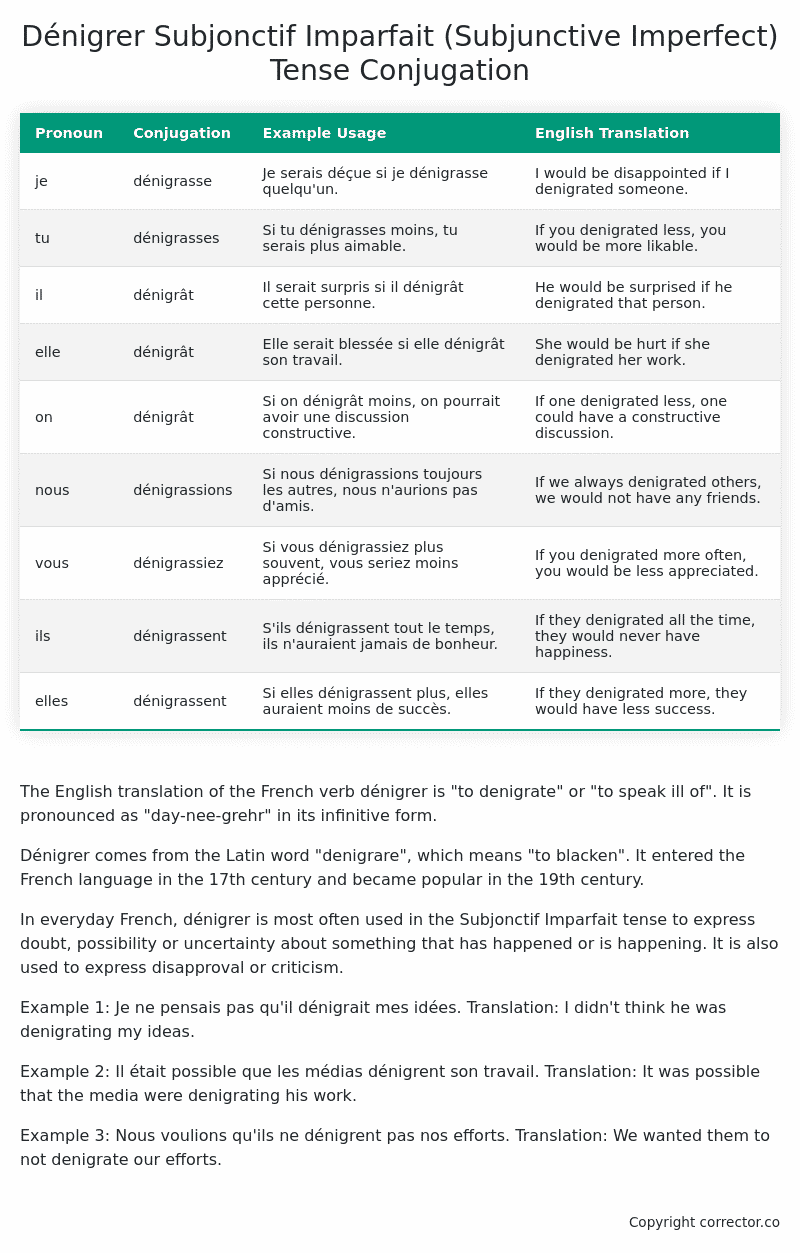Subjonctif Imparfait (Subjunctive Imperfect) Tense Conjugation of the French Verb dénigrer
Introduction to the verb dénigrer
The English translation of the French verb dénigrer is “to denigrate” or “to speak ill of”. It is pronounced as “day-nee-grehr” in its infinitive form.
Dénigrer comes from the Latin word “denigrare”, which means “to blacken”. It entered the French language in the 17th century and became popular in the 19th century.
In everyday French, dénigrer is most often used in the Subjonctif Imparfait tense to express doubt, possibility or uncertainty about something that has happened or is happening. It is also used to express disapproval or criticism.
Example 1: Je ne pensais pas qu’il dénigrait mes idées.
Translation: I didn’t think he was denigrating my ideas.
Example 2: Il était possible que les médias dénigrent son travail.
Translation: It was possible that the media were denigrating his work.
Example 3: Nous voulions qu’ils ne dénigrent pas nos efforts.
Translation: We wanted them to not denigrate our efforts.
Table of the Subjonctif Imparfait (Subjunctive Imperfect) Tense Conjugation of dénigrer
| Pronoun | Conjugation | Example Usage | English Translation |
|---|---|---|---|
| je | dénigrasse | Je serais déçue si je dénigrasse quelqu’un. | I would be disappointed if I denigrated someone. |
| tu | dénigrasses | Si tu dénigrasses moins, tu serais plus aimable. | If you denigrated less, you would be more likable. |
| il | dénigrât | Il serait surpris si il dénigrât cette personne. | He would be surprised if he denigrated that person. |
| elle | dénigrât | Elle serait blessée si elle dénigrât son travail. | She would be hurt if she denigrated her work. |
| on | dénigrât | Si on dénigrât moins, on pourrait avoir une discussion constructive. | If one denigrated less, one could have a constructive discussion. |
| nous | dénigrassions | Si nous dénigrassions toujours les autres, nous n’aurions pas d’amis. | If we always denigrated others, we would not have any friends. |
| vous | dénigrassiez | Si vous dénigrassiez plus souvent, vous seriez moins apprécié. | If you denigrated more often, you would be less appreciated. |
| ils | dénigrassent | S’ils dénigrassent tout le temps, ils n’auraient jamais de bonheur. | If they denigrated all the time, they would never have happiness. |
| elles | dénigrassent | Si elles dénigrassent plus, elles auraient moins de succès. | If they denigrated more, they would have less success. |
Other Conjugations for Dénigrer.
Le Present (Present Tense) Conjugation of the French Verb dénigrer
Imparfait (Imperfect) Tense Conjugation of the French Verb dénigrer
Passé Simple (Simple Past) Tense Conjugation of the French Verb dénigrer
Passé Composé (Present Perfect) Tense Conjugation of the French Verb dénigrer
Futur Simple (Simple Future) Tense Conjugation of the French Verb dénigrer
Futur Proche (Near Future) Tense Conjugation of the French Verb dénigrer
Plus-que-parfait (Pluperfect) Tense Conjugation of the French Verb dénigrer
Passé Antérieur (Past Anterior) Tense Conjugation of the French Verb dénigrer
Futur Antérieur (Future Anterior) Tense Conjugation of the French Verb dénigrer
Subjonctif Présent (Subjunctive Present) Tense Conjugation of the French Verb dénigrer
Subjonctif Passé (Subjunctive Past) Tense Conjugation of the French Verb dénigrer
Subjonctif Imparfait (Subjunctive Imperfect) Tense Conjugation of the French Verb dénigrer (this article)
Subjonctif Plus-que-parfait (Subjunctive Pluperfect) Tense Conjugation of the French Verb dénigrer
Conditionnel Présent (Conditional Present) Tense Conjugation of the French Verb dénigrer
Conditionnel Passé (Conditional Past) Tense Conjugation of the French Verb dénigrer
L’impératif Présent (Imperative Present) Tense Conjugation of the French Verb dénigrer
L’infinitif Présent (Infinitive Present) Tense Conjugation of the French Verb dénigrer
Struggling with French verbs or the language in general? Why not use our free French Grammar Checker – no registration required!
Get a FREE Download Study Sheet of this Conjugation 🔥
Simply right click the image below, click “save image” and get your free reference for the dénigrer Subjonctif Imparfait tense conjugation!

Dénigrer – About the French Subjonctif Imparfait (Subjunctive Imperfect) Tense
Formation
Common Everyday Usage Patterns
Interactions with Other Tenses
Subjonctif Présent
Indicatif Passé Composé
Conditional
Conditional Perfect
Summary
I hope you enjoyed this article on the verb dénigrer. Still in a learning mood? Check out another TOTALLY random French verb conjugation!


